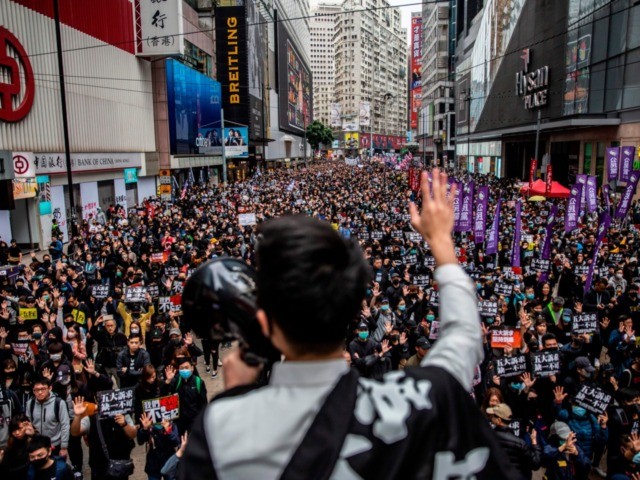Protesters in Hong Kong sent a message on Wednesday that they did not intend for their pro-democracy movement to die down in 2020, starting the year attracting one million to an assembly that concluded with police violently cracking down, arresting hundreds, and pepper-spraying a lawmaker in the face.
The New Year’s Day march, organized by the Civil Human Rights Front, received legal permission to occur from police, which likely helped attract larger numbers of people. Police, as they typically do, severely underestimated the crowd size, claiming only 60,000 people assembled. The protest went on peacefully until police officers, alleging that some protesters were vandalizing property owned by HSBC bank, abruptly shut it down, giving the million-sized crowd only half an hour to completely disperse before using tear gas and water cannons against them, according to the Hong Kong Free Press (HKFP).
HKFP noted that HSBC froze the funds of a pro-democracy non-profit, the Spark Alliance, which helps collect funds to pay for the legal defense of Hong Kong’s political prisoners and arrested protesters.
Protesters also reportedly targeted Hong Kong’s High Court, condemning the judge who sentenced Edward Leung to prison. Leung is a pro-democracy activist who ran for a lawmakers’ seat in 2016 using the slogan “Liberate Hong Kong, Revolution of Our Times,” which has become the unofficial slogan of the 2019 protest movement.
Hong Kong’s protest movement has focused on what it calls its “five key demands,” including one the Hong Kong government yielded to: the withdrawal of proposed legislation that would have allowed China’s Communist Party to extradite anyone present in Hong Kong for any reason, which would have violated the “One Country, Two Systems” policy that keeps Beijing from imposing itself on the capitalist city. The other four demands are an end to calling the protests “riots,” freedom for political prisoners, an independent investigation into police brutality, and the direct election of lawmakers. Currently, Hong Kong residents directly elect only a small number of the members of the Legislative Council, the rest chosen by special interest groups controlled by Beijing.
The protesters who organized Wednesday also urged residents to join trade unions to increase pressure on China-owned and controlled millionaire businessmen, some of whom have used their influence to try to silence protesters. Others attempted to increase the number of people registered to vote. The HKFP interviewed one protester who said she was attending the rally not to call for China to partially diminish its influence, but for full independence from Beijing. Some, the outlet noted, chanted “Hong Kong independence, the only way out.”
Police responded to the protest with mass arrests. Authorities confirmed about 400 arrests and conceded that many people arrested were not even confirmed to be participating protesters. Some were victims of police tear gas, water cannon, and pepper spray attacks. One protester, lawmaker Ted Hui, wore protective goggles in anticipation of tear gas, but a police officer ripped them off and pepper-sprayed him in the eyes.
now : Riot police just attacked Legislative Councillor Ted Hui Chi-fung and then pepper spraying citizens and journalists pic.twitter.com/rGtn2xU5xH
— Studio Incendo (@studioincendo) January 1, 2020
Police have apologized for none of the violence they inflicted, instead blaming the protesters for their own fate.
“You have to understand that when we stopped a few hundred people, of course there is a possibility that some of them are not involved. So, it would take time for the police to investigate, to make enquiries,” senior superintendent Ng Lok-chun said Wednesday of the arbitrary arrests. “If we know that they’re not involved, for sure we will release them unconditionally.”
Those not freed, he added, are facing charges of “unlawful assembly,” even though the Civil Human Rights Front secured a permit for the march.
Regarding the assault of a public servant, police claimed that Hui had invited the attack through “passive resistance.” Hui appeared in the video to attempt to intervene in tensions between protesters and police, which he and other pro-democracy lawmakers often attempt to do at protests. Police instead claimed that Hui had refused to follow orders to get off the street and onto the sidewalk, which contradicts video footage of the incident.
The police assault against Hui stands in sharp contrast to police disregarding the presence of pro-China former lawmaker Junius Ho at the site of violent thug assaults on pro-democracy protesters in July. Ho appeared to shake hands and congratulate white-clad thugs, later confirmed to have ties to triad organized crime groups, for beating unarmed protesters and bystanders with sticks.
“Advocating Hong Kong independence is inconsistent with the constitutional and legal status of the HKSAR [Hong Kong Special Administrative Region] as stipulated in the Basic Law,” the spokesman said. “Members of the public should treasure Hong Kong’s unique advantages under ‘One Country, Two Systems’ and should not do anything that would hurt the feelings of the Chinese people.”

COMMENTS
Please let us know if you're having issues with commenting.